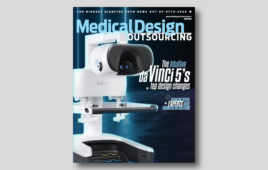
(Image from FDA)
The FDA today floated some ideas on how it might regulate medical devices armed with artificial intelligence — also known as software-as-a-medical-device (SaMD) — whose algorithms can change based on machine learning (ML) and possibly affect people in ways for which they were not approved or cleared. It is also asking for the public’s feedback.
To date, the agency has cleared or approved AI/ML-assisted devices whose algorithms have typically been locked before hitting the market. The FDA’s 20-page discussion paper includes a proposed regulatory framework for devices that have algorithms that can learn and change after the devices have been sold.
“The traditional paradigm of medical device regulation was not designed for adaptive AI/ML technologies, which have the potential to adapt and optimize device performance in real-time to continuously improve healthcare for patients,” the agency said. “The highly iterative, autonomous, and adaptive nature of these tools requires a new, total product lifecycle (TPLC) regulatory approach that facilitates a rapid cycle of product improvement and allows these devices to continually improve while providing effective safeguards.”
The FDA’s proposed approach borrows risk-management principles from a variety of sources, including the International Medical Device Regulators Forum (IMDRF), FDA’s 2016 software modifications guidance, its Digital Health Software Precertification Program and existing 510(k), De Novo, and PMA pathways. The agency also said it might need to ask Congress to boost its regulatory authority.
The proposal would require manufacturers to:
-
- Implement algorithm changes according to pre-specified performance objectives.
- Follow defined algorithm change protocols.
- Use a validation process to improve the performance,
safety, and effectiveness of AI/ML software. - Monitor real-world performance.
“This proposed TPLC regulatory framework aims to promote a mechanism for manufacturers to be continually vigilant in maintaining the safety and effectiveness of their SaMD, that ultimately, supports both FDA and manufacturers in providing increased benefits to patients and providers,” the agency said.
The FDA may also consider reviewing the software’s “predetermined change control plan.” This plan would include details about the types of anticipated modifications based on the algorithm’s re-training and update strategy, and the ways it would implement those changes to manage risks to patients.
“We’re working to develop an appropriate framework that allows the software to evolve in ways to improve its performance while ensuring that changes meet our gold standard for safety and effectiveness throughout the product’s lifecycle — from premarket design throughout the device’s use on the market,” said FDA commissioner Dr. Scott Gottlieb in a separate statement. “Our ideas are the foundational first step to developing a total product lifecycle approach to regulating these algorithms that use real-world data to adapt and improve.”
The discussion paper can be found here. It will be followed by a proposed guidance and final guidance, according to the agency.




![A photo of the Medtronic GI Genius ColonPro polyp detection system flagging a potential sign of colon cancer during a colonoscopy. [Photo courtesy of Medtronic]](https://www.medicaldesignandoutsourcing.com/wp-content/uploads/2024/04/Medtronic-GI-Genius-doctors-268x170.jpg)